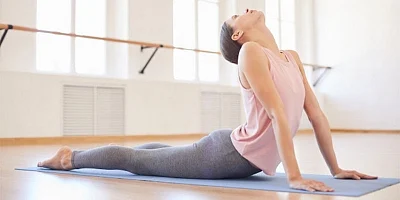It is nothing short of challenging to maintain a good posture while sitting at computers and working at desks for hours. Research has proved that prolonged bad posture can lead to compromised vertebrae alignment, pain, and nerve construction.
Bad posture also disturbs digestion, circulation, breathing, impaired cardiovascular health, and results in fatigue, teeth grinding, and bad mood.
Yoga is one of the best ways to turn this around. Weight-bearing exercises and strong core exercises may also be helpful. Yoga gives you the opportunity to actually correct your posture when practised frequently. Yoga poses help with alignment correction by generating increased awareness of the spine.
Let's have a look at the yoga poses you can try easily at home.
Cat-Cow Pose
The cat-cow pose is a gentle, simple pose that includes backbend stretches, which help mobilise the spine. This pose helps stretch your torso, shoulders, and neck.
This yoga pose focuses on various muscle groups like erector spinae, rectus abdominis, triceps, serratus anterior, and gluteus maximus.
You can follow these steps:
Go on all fours.
Your wrists go underneath your shoulders, and your knees will be placed underneath your hips.
Make sure you balance your weight evenly on all fours.
Breathe in and look up, let your stomach drop down toward the mat.
Breathe out and tuck your chin into your chest, draw your navel toward your spine, and your spine should be arched towards the ceiling.
Maintain focus while you practise this pose.
Focus on releasing tension in your body.
Hold the pose for at least 1 minute.
Cobra Pose
This stretches your abdomen, chest, and shoulders. It strengthens your spine and may soothe sciatica. It helps the muscle groups: hamstrings, gluteus maximus, deltoids, triceps, and serratus anterior.
Follow the steps:
Lie on your stomach and place your hands under your shoulders and your fingers facing forward.
Draw your arms to your chest and your elbows should not go out to the side.
Press into your hands and slowly lift your head, chest, and shoulders.
Lift partway, halfway, or all the way up.
Slightly bend your elbows.
Let your head drop back to deepen the pose.
Release back down to your mat and breathe out.
Bring your arms by your side and rest your head.
Slowly move your hips from side to side to release tension from your lower back.
Downward Dog
This is one of the traditional yoga poses in which you bend forward. It can be restful and rejuvenating. This pose can help relieve back pain and sciatica. It helps manage imbalances and improves strength.
The pose focuses on muscles like hamstrings, deltoids, gluteus maximus, triceps, and quadriceps. You should:
Get on all fours.
Your hands should be aligned under your wrists and your knees under your hips.
Press into your hands, tuck your toes, and lift up your knees.
Move your sitting bones slowly up toward the ceiling.
Slightly bend your knees and lengthen your spine and tailbone.
Your heels should be slightly off the ground.
Press firmly into your hands and distribute the weight on both sides of the body.
Pay attention to the position of your hips and shoulders.
Your head should be in line with your upper arms and your chin tucked in slightly.
Hold this pose for at least 1 minute.
Shoulder Headstand
A shoulder stand is one of the first poses that a trainer might ask you to try if you suffer from thyroid problems. It's an inversion pose and that is why it stimulates blood flow to the glands of the upper body.
It is believed that this yoga pose has a positive effect on the efficiency of the thyroid. Your chin tucked into your chest for this yoga pose is believed to benefit thyroid function.
You can try this at home by bending your elbows and placing your hands on your lower back in such a way that your fingertips point up toward the ceiling. Place your elbows on the ground, shoulder-width apart. Make sure your elbows do not splay out to the sides. When you get comfortable, slowly lift your thighs in a vertical position while keeping your knees bent.
Tiger Pose
The static tiger pose is an effective pose that helps relieve lower back pain caused due to poor posture. It not only stretches out the spinal column and nerves but also massages and relaxes the nerves specific to the lower back. The yoga pose also helps relax the abdominal muscles, promotes digestion, stimulates blood circulation, and helps burn fat.
Steps to do this pose:
Your hands and knees should be on the floor, take the position.
Now lift up one leg and stretch the opposite arm. Hold the Static Tiger Pose and take three deep breaths.
Come back to the first position and swap sides, extend the arm and opposite leg.
Look down at the mat and make sure the spine is in line. This pose will also help build core strength.
(At The Quint, we question everything. Play an active role in shaping our journalism by becoming a member today.)
